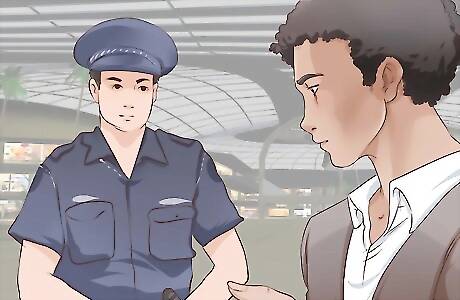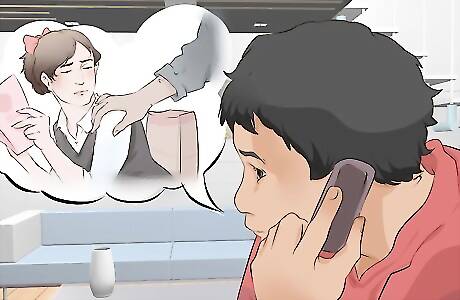
views
Reacting to Indecent Exposure and Public Lewdness

Stay calm and get yourself to safety. If you are subjected to public lewdness or indecent exposure, immediately try to get yourself away from the person. While your instinct may be to confront the perpetrator, it is best to move away from the person and let the police handle the situation. Public lewdness and/or indecent exposure are crimes in most states. Depending on the state, indecent exposure is the act of knowingly exposing your genitals to someone in public. Many states require that the person intend to alarm their victims and engage in the behavior as a means of sexual arousal. Public lewdness typically involves a person committing a lewd act in public, such as masturbating, and that people who witness the behavior feel alarmed or affronted. Some states charge public lewdness as a Class C Misdemeanor, which may require that a person found guilty pay a fine and/or serve time in jail. For a state-by-state overview of laws regarding public lewdness and indecent exposure visit: http://www.stopstreetharassment.org/wp-content/uploads/2013/12/SSH-KnowYourRights-StreetHarassmentandtheLaw-20131.pdf.

Involve the police. While some people may dismiss a person's penchant for flashing their genitalia or masturbating in public, it is important that you recognize that this is a criminal act and that there is a victim. If you witnessed either of these activities then you have been subjected to criminal behavior. In some circumstances exhibitionists (those engaging in indecent exposure or public lewdness) escalate their behavior to sexual assault. Some states require that the person charged with indecent exposure have the intent to arouse sexual gratification. This is to make sure that someone who is urinating in public is not automatically charged with public indecency. In other states, the mere act of exposing your genitals to another in public is enough to give rise to a misdemeanor. Some states include public masturbation within their indecent exposure laws, whereas others may refer to this activity as public lewdness. The people most often targeted by indecent behavior are women but children are also targeted. Some states have enhanced criminal penalties for indecent exposure or public lewdness when a child was exposed to the behavior.

Call 911 if you feel threatened or unsafe. If you are the victim of public lewdness or indecent exposure you can call 911. You can call 911 for the following reasons: If a crime is in progress. If you or someone else is being threatened with physical violence. If you can provide information about who is committing a crime. If you are going to call 911, call them as soon as you are at a safe distance from the perpetrator. Reporting a crime of this nature can give you a sense of empowerment and may prevent the person from subjecting other people to his or her criminal conduct.

Report criminal activity after the fact. If you did not immediately call the police, you can still report the criminal behavior. In this instance, you would not call 911 but instead you would call the local precinct where you were subject to the indecent exposure or public lewdness. As soon as possible, write down everything you remember from the incident, including what if anything the perpetrator said or did; where the harassment occurred; whether other people also witnessed the indecent conduct; and provide any other information that may be helpful in identifying the perpetrator. If you call to report a crime, the police may ask you to come to the police station or meet you at your home to take your statement. Be specific as possible when describing where you were accosted and provide the police with a physical description of the perpetrator.
Responding to Specific Types of Indecent Exposure

React to indecent exposure on public transportation. Many people report being subjected to indecent behavior while on public transportation. If you feel unsafe, you should draw attention to the indecent behavior and move away from the person. By drawing attention to the conduct, your fellow commuters may be able to offer you some support or protection from the offending conduct. If you see someone committing acts of indecent exposure or public lewdness on public transportation, take a picture or video of the person, only if you can do so safely. The image will help police locate the offender. Some public transportation companies also have a way for you to report sexual misconduct. For example, the MTA in New York City allows people to make complaints about sexual misconduct on its website. You can always report the conduct to the bus driver or conductor and they will be able to help you report the crime.

Report harassment at work. Some people fail to report indecent behavior by a co-worker or their supervisor because they are afraid they may lose their job. This type of conduct is considered sexual harassment and employers are legally responsible to prevent and respond to this type of conduct. If you do not feel comfortable discussing the matter with your supervisor, report the conduct to a person in charge of human resources. You should also request a copy of your employer's sexual harassment policy. If you are a member of a union you should report the conduct to your union representative and file a claim within 6 months of the incident. You can also file a claim with the Equal Employment Opportunity Commission (EEOC) but you must do so within 180 days of the incident. You can also file a report with local law enforcement.

Respond appropriately to a person with mental health issues. Individuals with developmental or intellectual disabilities may not be able to judge whether actions like this are appropriate. If you are around individuals with severe disabilities, be kind and talk to their guardians or caretakers about an appropriate response to unwanted behavior. Sometimes ignoring the behavior is the best course of action. Other types of mental health problems may call for a different type of response. If you feel that you or anyone else is in immediate physical danger, slowly move away from the person and do not make any threatening moves in their direction. Call the police and indicate that a mentally ill person is exposing himself in public. The police should be trained to respond to people with mental health issues and can direct him to the appropriate services, including a psychiatric hospital.
Following Through on Your Complaint to the Police

Report the crime. If you called 911 or reported the indecent behavior to the police, the police will take a detailed statement from you. If you called 911, police officers may show up at the scene of the harassment and arrest the perpetrator if he or she is still in the vicinity. If you filed a report, the police will investigate and attempt to apprehend the perpetrator.

Have the perpetrator arrested. If the police locate and arrest the perpetrator, depending on the state, he or she will be subject to criminal prosecution for the behavior. If this is a first offense, the person will usually be charged with a misdemeanor. However, if the person is a repeat offender, depending on the state and the number of previous convictions for indecent exposure, the person may be facing felony charges or a longer jail sentence.

Participate in the legal process. If the perpetrator does not take a plea and chooses to go to court, you may be called as a witness at trial. The prosecutor (also known as the assistant district attorney) will contact you and discuss whether they need you to testify in court. While it may feel stressful to testify in court, it is an important and meaningful step to ensuring that others are not subjected to the perpetrator's conduct.


















Comments
0 comment